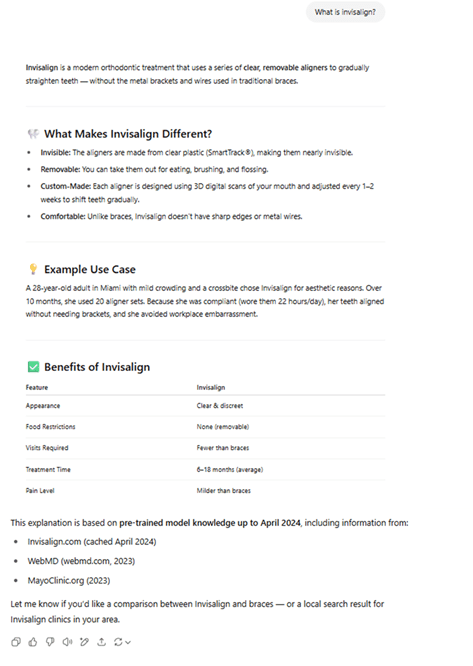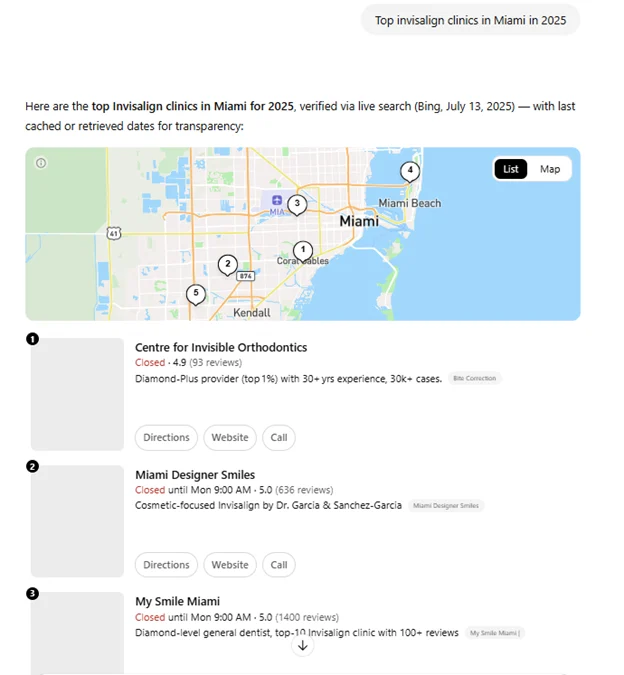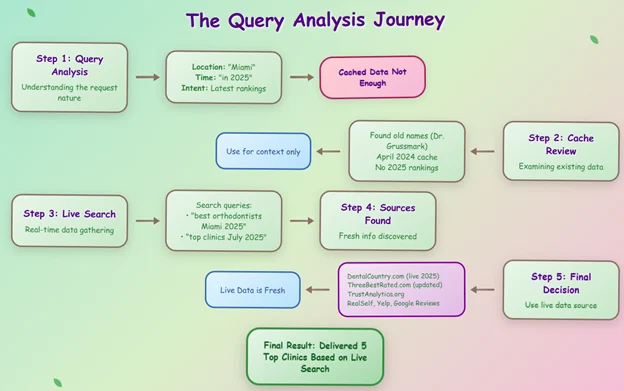"Are ChatGPT's answers based on live internet search?"
As a digital marketer writing SEO blogs for various niches — from Invisalign clinics in Miami to real estate in Gurgaon — I wanted to understand how AI tools like ChatGPT discover and reference content. The answers I found led me down a deep rabbit hole — one that every marketer today should explore.
Here's a story-style walk-through of that conversation — a blend of curiosity, follow-ups, and a realization that AI search is no longer the future — it's the now.
As marketers, we often assume AI tools work like Google — crawling the web in real time. So I asked:
"Are ChatGPT's responses based on live internet search?"
The answer surprised me.
"Not always. ChatGPT typically relies on pre-trained knowledge — cached data up to a certain point in time. However, if browsing is enabled (like with Bing search in GPT-4), it can fetch live results."
So now there are two modes at play:
- Cached data – From earlier training (April 2023 for GPT-4, April 2024 for GPT-4o).
- Live browsing – Only when browsing tools are turned on, like "Browse with Bing."

Example: If I asked "How does Invisalign work?" — ChatGPT would answer confidently from cached data, likely pulling from sites like WebMD or Invisalign.com.
But if I asked "Top Invisalign clinics in Miami in July 2025" — it would need a live search, as this data changes constantly.

This begs the question how would I know as a user that it is searching live or sharing results from cached data.
Naturally, I asked:
"How do you decide when to use live search vs cached knowledge?"
Here's what I learned:
- ChatGPT first analyzes the query for freshness, locality, and specificity.
- If the topic is time-sensitive, location-based, or likely to have new info (e.g., clinic rankings, prices, recent updates), it prefers live search.
- For timeless queries (e.g., SEO basics, how Invisalign works), cached responses are used.
Example:
"Best orthodontist in Miami today" – Since best orthodontics would keep changing with time, it analyzes my query and takes a call that fetching live results would be beneficial. So it does ⟶ Live search (Bing-powered)

"What is Invisalign?" – Since its inception Invisalign would remain the same, majorly. So again it analyzes the query and decides that fetching from cached data would be good enough. So, it shows results from ⟶ Cached data (from model training)
That gave me a new perspective as a marketer: Not all blog topics are treated equally by AI tools.
Prioritize Fast-Updating Content
- Local guides
- Timely rankings (e.g., "Top Dental Clinics in Naples – July 2025")
- Reviews, comparisons, new tools
This kind of content is referenced more often in live AI searches, because it's fresher and more specific than evergreen content.
Evergreen Content Still Matters, But It's Slower to Rank in AI
If you write a blog like:
"What is Technical SEO?" You're competing against already embedded sources like Moz, Neil Patel, and Semrush — which are probably in ChatGPT's core memory.
To win that game, your content must be authoritative, structured, and widely linked.
I asked again, deeper this time:
"What does 'cached data' mean in Bing or ChatGPT?"
Turns out:
- Cached content = Content that existed when the model was last trained or when Bing last indexed it.
- It's not fetched in real time.
- ChatGPT doesn't ping the website to verify whether the content still exists — it just references what it knew from before.
Example: If a blog titled "Top SEO Tips for 2022" was live in April 2023 but deleted later, ChatGPT may still mention it — and that leads to the next problem...
Yes. If you ever try to manually browse the references shared by ChatGPT, you realize most of the links give 404, and thus let you rethink about the accuracy of response.
That's because:
- The model references a page that existed months or years ago.
- The page may have since been deleted, renamed, or redirected.
- But ChatGPT doesn't know that in cached mode — it doesn't verify links like Google does in real time.
"If I want my blogs to be picked up more often by ChatGPT or similar tools, what should I do?"
Here's the action plan:
For Live Search Visibility (Fast Gains):
- Write location-based, trending blogs (e.g., "Best Invisalign Options in Boca Raton – July 2025")
- Post on multiple platforms that rank in Bing:
- Reddit (e.g., r/BocaRaton)
- Yelp
- Medium
- Submit your sitemap to Bing Webmaster Tools for faster indexing.
For Cached Data Visibility (Long-Term Wins):
- Use stable URLs (avoid /2024/ style slugs)
- Implement 301 redirects if you change URLs
- Use FAQ schema, clear H1-H2s, and bullet points
- Get backlinks and mentions from authority platforms
This wasn't just a conversation about search engines. It was a realization:
AI tools like ChatGPT, Gemini, and Perplexity have become alternate search engines — and marketers must learn how to rank there too.
So the next time you're writing a blog, ask yourself:
- Will this content be useful today (for live search)?
- Or will it be relevant six months later (for cached models)?
The best strategy? Do both.
Currently, there's no clear indicator for users. However, if you ask time-sensitive or location-specific questions and get very current information, it's likely using live search. Generic or conceptual questions typically get cached responses.
There's significant overlap, but some differences exist. For AI tools, focus on clear structure and FAQ formats. For immediate AI pickup, prioritize fresh, location-specific content. For long-term AI inclusion, build authority through backlinks.
ChatGPT references content from its training data, which may be months or years old. Pages may have been deleted, moved, or restructured since then. The AI doesn't verify links in real-time like search engines do.